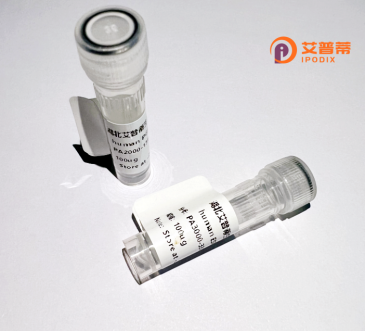
| 纯度 | >90%SDS-PAGE. |
| 种属 | Human |
| 靶点 | ATP6AP1 |
| Uniprot No | Q15904 |
| 内毒素 | < 0.01EU/μg |
| 表达宿主 | E.coli |
| 表达区间 | 1-470aa |
| 氨基酸序列 | MMAAMATARVRMGPRCAQALWRMPWLPVFLSLAAAAAAAAAEQQVPLVLWSSDRDLWAPAADTHEGHITSDLQLSTYLDPALELGPRNVLLFLQDKLSIEDFTAYGGVFGNKQDSAFSNLENALDLAPSSLVLPAVDWYAVSTLTTYLQEKLGASPLHVDLATLRELKLNASLPALLLIRLPYTASSGLMAPREVLTGNDEVIGQVLSTLKSEDVPYTAALTAVRPSRVARDVAVVAGGLGRQLLQKQPVSPVIHPPVSYNDTAPRILFWAQNFSVAYKDQWEDLTPLTFGVQELNLTGSFWNDSFARLSLTYERLFGTTVTFKFILANRLYPVSARHWFTMERLEVHSNGSVAYFNASQVTGPSIYSFHCEYVSSLSKKGSLLVARTQPSPWQMMLQDFQIQAFNVMGEQFSYASDCASFFSPGIWMGLLTSLFMLFIFTYGLHMILSLKTMDRFDDHKGPTISLTQIV |
| 分子量 | 78.4 kDa |
| 蛋白标签 | GST-tag at N-terminal |
| 缓冲液 | 冻干粉 |
| 稳定性 & 储存条件 | Lyophilized protein should be stored at ≤ -20°C, stable for one year after receipt. Reconstituted protein solution can be stored at 2-8°C for 2-7 days. Aliquots of reconstituted samples are stable at ≤ -20°C for 3 months. |
| 复溶 | Always centrifuge tubes before opening.Do not mix by vortex or pipetting. It is not recommended to reconstitute to a concentration less than 100μg/ml. Dissolve the lyophilized protein in distilled water. Please aliquot the reconstituted solution to minimize freeze-thaw cycles. |
以下是关于 **ATP6AP1(V型质子ATP酶亚基S1)** 的3篇代表性文献摘要信息:
---
1. **文献名称**:*ATP6AP1 deficiency impairs the function of osteoclasts and lysosomal acidification*
**作者**:Sun, L. et al.
**摘要**:研究发现 **ATP6AP1** 通过调节溶酶体酸化作用,影响破骨细胞的骨吸收功能。基因敲除小鼠模型中,ATP6AP1缺失导致溶酶体pH失衡,揭示了其在V-ATP酶复合体中的关键作用。
---
2. **文献名称**:*ATP6AP1 interacts with the immune response modulator FAM98B in hepatocellular carcinoma*
**作者**:Zhang, Y. et al.
**摘要**:该文献揭示 **ATP6AP1** 与肝癌相关蛋白FAM98B的直接相互作用,并发现两者共同调控细胞自噬和炎症反应,提示其在肝癌发生中的潜在分子机制。
---
3. **文献名称**:*Structural insights into the V-ATPase complex: Role of ATP6AP1 in subunit assembly*
**作者**:Toei, M. et al.
**摘要**:通过冷冻电镜技术解析 **ATP6AP1** 在V-ATP酶复合体中的三维结构,发现其作为连接跨膜区和胞质区的支架蛋白,对V-ATP酶组装及质子转运活性至关重要。
---
如需具体文献链接或补充更多研究,可告知进一步方向!
ATP6AP1 (ATPase H+ Transporting Accessory Protein 1) is a critical subunit of the vacuolar-type H+-ATPase (V-ATPase), a multisubunit proton pump responsible for acidifying intracellular compartments like lysosomes, endosomes, and secretory vesicles. This acidification is essential for processes such as protein degradation, membrane trafficking, and neurotransmitter release. As an accessory subunit, ATP6AP1 plays a structural and regulatory role in V-ATPase assembly, stability, and localization. It contains multiple conserved domains, including a single transmembrane helix, and interacts with other V-ATPase subunits to facilitate proton translocation across membranes.
Beyond its canonical function, ATP6AP1 has been implicated in diverse physiological and pathological contexts. Studies link it to X-linked intellectual disability, Parkinson’s disease, and cancers, where its dysregulation may disrupt lysosomal function or promote tumorigenesis through microenvironment acidification. In neurodegeneration, impaired ATP6AP1 activity compromises autophagic-lysosomal pathways, contributing to pathogenic protein aggregation. Additionally, ATP6AP1 participates in non-canonical signaling pathways, including Wnt/β-catenin and mTOR pathways, influencing cell growth and survival.
Recombinant human ATP6AP1 is widely used to study V-ATPase mechanisms, protein-protein interactions, and therapeutic targeting. Its involvement in disease pathways underscores its potential as a biomarker or drug target, particularly for cancer and neurodegenerative disorders. Research continues to unravel its dual roles in cellular homeostasis and disease progression.
×